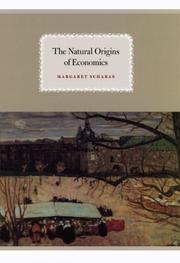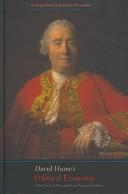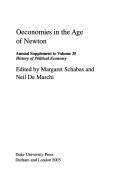| Listing 1 - 7 of 7 |
Sort by
|

ISBN: 0226735699 0226735702 9786612070204 1282070207 0226735710 9780226735719 9780226735696 661207020X 9781282070202 9780226735702 Year: 2005 Publisher: Chicago, Ill. University of Chicago Press
Abstract | Keywords | Export | Availability | Bookmark
 Loading...
Loading...Choose an application
- Reference Manager
- EndNote
- RefWorks (Direct export to RefWorks)
References to the economy are ubiquitous in modern life, and virtually every facet of human activity has capitulated to market mechanisms. In the early modern period, however, there was no common perception of the economy, and discourses on money, trade, and commerce treated economic phenomena as properties of physical nature. Only in the early nineteenth century did economists begin to posit and identify the economy as a distinct object, divorcing it from natural processes and attaching it exclusively to human laws and agency. In The Natural Origins of Economics, Margaret Schabas traces the emergence and transformation of economics in the eighteenth and nineteenth centuries from a natural to a social science. Focusing on the works of several prominent economists-David Hume, Adam Smith, Thomas Malthus, David Ricardo, and John Stuart Mill-Schabas examines their conceptual debt to natural science and thus locates the evolution of economic ideas within the history of science. An ambitious study, The Natural Origins of Economics will be of interest to economists, historians, and philosophers alike.
Economic schools --- Economics. --- Science. --- Natural science --- Science of science --- Sciences --- Economic theory --- Political economy --- Social sciences --- Economic man --- Economics --- Science --- E-books --- Natural sciences --- economy, economist, modern, contemporary, market, marketplace, capital, time period, era, agency, laws, legal, litigation, 18th, 19th, 20th, century, social, natural, science, david hume, adam smith, thomas malthus, john stuart mill, study, history, historical, historian, philosophy, philosopher, philosophical, neoclassical, economics, french, enlightenment.
Book
ISBN: 0691085439 1322019193 9780691085432 Year: 1990 Publisher: Princeton, N.J. Princeton University Press
Abstract | Keywords | Export | Availability | Bookmark
 Loading...
Loading...Choose an application
- Reference Manager
- EndNote
- RefWorks (Direct export to RefWorks)
Economics, Mathematical --- 330.2 --- 330.3 --- AA / International- internationaal --- Economics --- Mathematical economics --- Econometrics --- Mathematics --- Economische analyse en research. Theorie van de informatie. --- Methode in staathuishoudkunde. Statische, dynamische economie. Modellen. Experimental economics --- Methodology --- Jevons, William Stanley --- Jevons, W. Stanley --- Dzhevons, V. St. --- Quantitative methods (economics) --- Economics, Mathematical. --- Jevons, William Stanley, --- Economische analyse en research. Theorie van de informatie --- Jevons, William Stanley, - 1835-1882
Book
ISBN: 9781400861514 1400861519 Year: 2014 Publisher: Princeton, NJ
Abstract | Keywords | Export | Availability | Bookmark
 Loading...
Loading...Choose an application
- Reference Manager
- EndNote
- RefWorks (Direct export to RefWorks)
If any single characteristic differentiates current, neoclassical economics from the classical economics of Adam Smith and David Ricardo, it is the use of mathematics. Pointing to the critical role of William Stanley Jevons (1835-1882), Margaret Schabas demonstrates that the advent of mathematical economics in late Victorian England resulted more from new currents in logic and the philosophy of science than from problems specific to the classical theory of value and distribution.Jevons's Principles of Science (1874) was the first book to take issue with John Stuart Mill's faith in inductive reasoning, to assimilate George Boole's mathematical logic, and to discern many of the limitations that beset scientific inquiry. Together with a renewed appreciation for Bentham's utility calculus, these philosophical insights served to convince Jevons and his followers that the economic world is fundamentally quantitative and thus amenable to mathematical analysis.Originally published in 1990.The Princeton Legacy Library uses the latest print-on-demand technology to again make available previously out-of-print books from the distinguished backlist of Princeton University Press. These editions preserve the original texts of these important books while presenting them in durable paperback and hardcover editions. The goal of the Princeton Legacy Library is to vastly increase access to the rich scholarly heritage found in the thousands of books published by Princeton University Press since its founding in 1905.
Economics, Mathematical --- Economics --- Mathematical economics --- Econometrics --- Mathematics --- Methodology --- Jevons, William Stanley, --- Jevons, W. Stanley --- Dzhevons, V. St. --- E-books --- Business & Economics --- Economic Theory --- Economics, Mathematical.
Book
Year: 1990 Publisher: Princeton University Press
Abstract | Keywords | Export | Availability | Bookmark
 Loading...
Loading...Choose an application
- Reference Manager
- EndNote
- RefWorks (Direct export to RefWorks)
Book
ISBN: 9780226597447 9780226691251 022669125X 022669125X 022659744X Year: 2020 Publisher: Chicago, Ill. The University of Chicago Press
Abstract | Keywords | Export | Availability | Bookmark
 Loading...
Loading...Choose an application
- Reference Manager
- EndNote
- RefWorks (Direct export to RefWorks)
Although David Hume's contributions to philosophy are firmly established, his economics has been largely overlooked. 'A Philosopher's Economist' offers the definitive account of Hume's 'worldly philosophy' and argues that economics was a central preoccupation of his life and work. Margaret Schabas and Carl Wennerlind show that Hume made important contributions to the science of economics, notably on money, trade, and public finance.
Economists --- Capitalism --- History --- Hume, David, --- Economic order --- Hume, David --- Philosophy --- Economics --- Capitalism. --- Economists. --- History. --- Philosophy. --- Influence. --- David Hume. --- Enlightenment. --- capitalism. --- economics. --- human nature. --- polite society. --- secular mores. --- trade and commerce. --- Social scientists --- Market economy --- Profit --- Capital --- Home, David, --- Hsiu-mo, Ta-wei, --- Hume, Dawid, --- Hyūma, --- Hyūma, Ḍeviḍa, --- I͡Um, D., --- Yum, Daṿid, --- Economists - Biography --- Capitalism - History --- Capitalism - Philosophy --- Hume, David, - 1711-1776

ISBN: 9780415320016 9780203324479 9781134362455 9781134362493 9780415494137 Year: 2008 Publisher: London Routledge
Abstract | Keywords | Export | Availability | Bookmark
 Loading...
Loading...Choose an application
- Reference Manager
- EndNote
- RefWorks (Direct export to RefWorks)
Economics --- History --- Hume, David

ISSN: 00182702 ISBN: 0822365863 9780822365860 Year: 2003 Volume: 35 Publisher: Durham, N.C. Duke University Press
Abstract | Keywords | Export | Availability | Bookmark
 Loading...
Loading...Choose an application
- Reference Manager
- EndNote
- RefWorks (Direct export to RefWorks)
Economic schools --- Economics --- Economie politique --- History --- Histoire. --- Histoire --- AA / International- internationaal --- 330.44 --- 92 --- 330.43 --- 320.1 --- Adam Smith. --- Geschiedenis. --- Mercantilisme en fysiocratie. --- Politieke wetenschap. Politieke leerstelsels. --- History. --- 92 Geschiedenis. --- 92 Histoire. --- 92 History. --- Economic theory --- Political economy --- Social sciences --- Economic man --- Politieke wetenschap. Politieke leerstelsels --- Mercantilisme en fysiocratie --- Adam Smith --- Geschiedenis --- Economics - History - 17th century --- Economics - History - 18th century
| Listing 1 - 7 of 7 |
Sort by
|

 Search
Search Feedback
Feedback About UniCat
About UniCat  Help
Help News
News